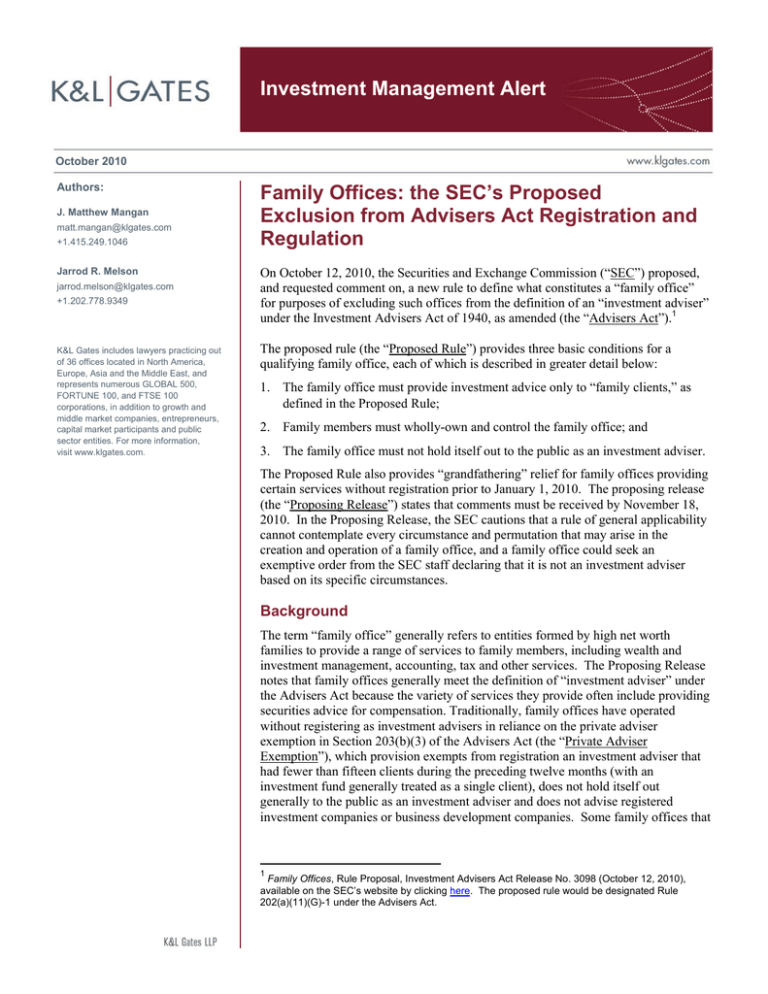
Investment Management Alert
October 2010
Authors:
J. Matthew Mangan
matt.mangan@klgates.com
+1.415.249.1046
Jarrod R. Melson
jarrod.melson@klgates.com
+1.202.778.9349
K&L Gates includes lawyers practicing out
of 36 offices located in North America,
Europe, Asia and the Middle East, and
represents numerous GLOBAL 500,
FORTUNE 100, and FTSE 100
corporations, in addition to growth and
middle market companies, entrepreneurs,
capital market participants and public
sector entities. For more information,
visit www.klgates.com.
Family Offices: the SEC’s Proposed
Exclusion from Advisers Act Registration and
Regulation
On October 12, 2010, the Securities and Exchange Commission (“SEC”) proposed,
and requested comment on, a new rule to define what constitutes a “family office”
for purposes of excluding such offices from the definition of an “investment adviser”
under the Investment Advisers Act of 1940, as amended (the “Advisers Act”).1
The proposed rule (the “Proposed Rule”) provides three basic conditions for a
qualifying family office, each of which is described in greater detail below:
1. The family office must provide investment advice only to “family clients,” as
defined in the Proposed Rule;
2. Family members must wholly-own and control the family office; and
3. The family office must not hold itself out to the public as an investment adviser.
The Proposed Rule also provides “grandfathering” relief for family offices providing
certain services without registration prior to January 1, 2010. The proposing release
(the “Proposing Release”) states that comments must be received by November 18,
2010. In the Proposing Release, the SEC cautions that a rule of general applicability
cannot contemplate every circumstance and permutation that may arise in the
creation and operation of a family office, and a family office could seek an
exemptive order from the SEC staff declaring that it is not an investment adviser
based on its specific circumstances.
Background
The term “family office” generally refers to entities formed by high net worth
families to provide a range of services to family members, including wealth and
investment management, accounting, tax and other services. The Proposing Release
notes that family offices generally meet the definition of “investment adviser” under
the Advisers Act because the variety of services they provide often include providing
securities advice for compensation. Traditionally, family offices have operated
without registering as investment advisers in reliance on the private adviser
exemption in Section 203(b)(3) of the Advisers Act (the “Private Adviser
Exemption”), which provision exempts from registration an investment adviser that
had fewer than fifteen clients during the preceding twelve months (with an
investment fund generally treated as a single client), does not hold itself out
generally to the public as an investment adviser and does not advise registered
investment companies or business development companies. Some family offices that
1
Family Offices, Rule Proposal, Investment Advisers Act Release No. 3098 (October 12, 2010),
available on the SEC’s website by clicking here. The proposed rule would be designated Rule
202(a)(11)(G)-1 under the Advisers Act.
Investment Management Alert
could not, or did not wish to, abide by the limitations
of the Private Adviser Exemption applied for and
received exemptive relief from the SEC declaring
that they were not within the intent of the Advisers
Act. The SEC has granted thirteen of these orders
since 1940. Exemptive orders have distinguished
between “family offices” that provide advice to one
family and “family-run offices” that, though owned
and controlled by one family, provide advice to
multiple clients, including non-family members.
With limited exceptions, the SEC has provided relief
only to family offices that provide investment advice
to a single family and their lineal descendants.
(collectively defined in the Proposed
Rule as the “Founders”);
The Dodd-Frank Act, signed into law on July 21,
2010, repeals the Private Adviser Exemption
effective July 21, 2011. As a result, previously
unregistered advisers that relied on the exemption
will need to either register as investment advisers or
find another exemption from registration. Congress
and the SEC, however, both have indicated that the
Advisers Act “was not designed to regulate the
interactions of family members in the management
of their own wealth.”2 Specifically, the Dodd-Frank
Act calls for the SEC to promulgate a rule to define
a “family office” that is “consistent with the
previous exemptive policy of the SEC,” as reflected
in its past exemptive orders, and that recognizes “the
range of organizational, management, and
employment structures and arrangements employed
by family offices[.]”3
Three Requirements of the Proposed
Rule
1. The family office must provide investment
advice only to “family clients.”
The Proposed Rule defines “Family Client” to
mean:
•
Family members (“Family Members”),
meaning:
o
2
3
4
the founder of the family office and his
or her spouse or spousal equivalent4
Proposing Release at *8.
See Dodd-Frank Act § 409.
“Spousal equivalent” is defined as a co-habitant occupying a
relationship generally equivalent to that of a spouse. See
•
o
the Founders’ parents;
o
the Founders’ lineal descendants
(including adopted children and
stepchildren);
o
such lineal descendants’ spouses or
spousal equivalents;
o
the Founders’ siblings and such
siblings’ spouses or spousal
equivalents; and
o
such siblings’ lineal descendants
(including adopted children and
stepchildren) and such lineal
descendants’ spouses or spousal
equivalents.5
Former family members a (“Former Family
Member”), such as a divorced spouse and his
or her siblings and parents. Former Family
Members would be permitted to maintain
investments and fulfill contractual investment
commitments made prior to the time they
become Former Family Members, but would
not be permitted to make any new
investments through or contribute new assets
to the family office’s management.6
Proposing Release at *12, n. 24. This term is taken from the
SEC’s auditor independence requirements in Rule 2-01 of
Regulation S-X. See Revisions of the Commission’s Auditor
Independence Requirements, 1933 Act Release No. 7919
(Nov. 21, 2000). The SEC notes that it has never been asked
in an exemptive application to permit a family office to provide
advice to a spousal equivalent, and, therefore, has never
before done so. Proposing Release at *12.
5
The SEC notes that this definition of “family member”
generally conforms to the types of family members it has
included in its exemptive orders, except that it has not always
treated stepchildren in the same manner as other family
members. Proposing Release at *10. The Proposing Release
cites one instance in which it permitted a family office to
provide investment advice to stepchildren, but required that
the stepchildren be given additional disclosure and that the
stepchildren provide written consent to the arrangement. See
WLD Enterprises, Inc., Investment Advisers Act Release Nos.
2804 (October 17, 2008) (notice) and 2807 (November 14,
2008) (order).
6
The SEC notes that none of its exemptive orders have
permitted former family members to continue to receive advice
October 2010
2
Investment Management Alert
•
Certain charitable entities, family trusts and
other family entities, including:
o
•
charitable foundations, charitable
organizations or charitable trusts
established and funded exclusively by
one or more Family Members or
Former Family Members;
o
any trust or estate existing for the sole
benefit of one or more Family Clients
(a “Family Client Trust”); and
o
any limited liability company,
partnership, corporation or other entity
wholly-owned and controlled (directly
or indirectly) by, and operated for the
sole benefit of, one or more Family
Clients (a “Family Client Vehicle”),
which is not a registered investment
company under the Investment
Company Act of 1940, as amended (the
“1940 Act”).7
Certain key employees of the family office
(“Key Employees”), including:
o
o
an executive officer, director trustee,
general partner or person serving in a
similar capacity;
any other employee of the family office
(other than employees performing
solely clerical, secretarial or
administrative functions) who, in
connection with his or her regular
duties, has participated in the
investment activities of the family
office, or similar functions or duties for
from a family office, but it sought to provide clarity to family
offices affected by a divorce or other legal separation.
Proposing Release at *16.
7
The SEC notes that these entities, intended to serve Family
Clients, have generally been deemed permitted clients of
family offices under the SEC’s exemptive orders to “allow the
family office to structure its activities through typical investment
structures.” Proposing Release at *18.
or on behalf of another company, for at
least twelve months;8 or
o
a Family Client Trust or Family Client
Vehicle created for the sole benefit of
and wholly-owned and controlled by a
Key Employee.
Once a Key Employee no longer serves as a family
office employee, the employee is treated in the same
manner as a Former Family Member, described
above.
Subject to the grace period described below, a
family office may not provide advice to clients that
are not Family Clients under the Proposed Rule,
even if those clients received investments as a result
of an involuntary transfer from a Family Client,
such as through gift or bequest either by a Family
Client or his or her estate. In the case of such an
involuntary transfer, the family office can provide
advice with respect to the investment for four
months after the date of the involuntary transfer.
The SEC believes this grace period will give clients
that are not Family Clients the opportunity to
dispose of the investment, restructure the
investment, transfer the investment or seek
exemptive relief.9
8
This standard is based on the “knowledgeable employee”
standard in Rule 205-3 under the Advisers Act. Proposing
Release at *20. The SEC notes that key employees have
been considered family clients in some of its exemptive
applications to family offices. See Proposing Release at *20.
9
In the Proposing Release, the SEC notes it has never issued
an exemptive order permitting a family office to advise a nonfamily member after an involuntary transfer of an investment
to that person, but recognizes that the treatment of involuntary
transfers under the Proposed Rule differs from the manner in
which it and its staff have at times treated involuntary transfers
in other contexts. See Proposing Release at *15. For
example, the involuntary transfer of shares or interests in a
private investment fund operating without investment
company registration under Section 3(c)(7) of the 1940 Act
does not require that the sponsor or manager look to the
qualifications of the recipient for purposes of that section
(which requires investors to be “qualified purchasers”);
instead, the recipient is able to “piggy-back” off the
qualifications of the transferring party and the transfer is
treated as never having occurred regardless of whether the
transferee could have made the investment directly. See
Section 3(c)(7)(A) of the 1940 Act (“Securities that are owned
by persons who received the securities from a qualified
purchaser as a gift or bequest, or in a case in which the
transfer was caused by legal separation, divorce, death, or
other involuntary event, shall be deemed to be owned by a
qualified purchaser[.]”).
October 2010
3
Investment Management Alert
The SEC states that it did not include as a Family
Client under the Proposed Rule “every type of
individual or entity that has been included in a prior
exemptive order based on specific facts and
circumstances.” Although the Dodd-Frank Act
requires the SEC to adopt a rule “consistent” with its
previous exemptive guidance, the SEC believes a
rule of general applicability cannot contemplate
every type of relationship between a Founder and
another person that could or should justifiably cause
that person to be deemed a Family Client.
2. The family office must be wholly-owned and
controlled by Family Members.
To qualify as a family office under the Proposed
Rule, a family office must be wholly-owned and
controlled, directly or indirectly, by Family
Members. Whole ownership was generally a
requirement of the SEC’s exemptive orders granted
to family offices. Whole ownership removes the
need to require that a family office not operate in a
manner that creates a profit, which the SEC
commonly required in its exemptive orders. The
SEC feels that this not-for-profit requirement is
unnecessary when the family office is wholly-owned
by family members, since “any profits generated by
the family office from managing [Family Client’s]
assets only accrue to family members.”10
Often, a portfolio manager of an investment adviser
will hold an equity stake in the adviser, allowing the
manager to receive as compensation and treat as
capital gains a portion of the performance-based
compensation paid to the adviser. Key Employees’
inability to hold an equity interest in the family
office may complicate, but not necessarily preclude,
efforts to provide such employees with performancebased compensation.
3. The family office must not hold itself out to the
public as an investment adviser.
A family office, managing the wealth and
investments of Family Clients, would have little
reason to hold itself out to the public or to maintain
any significant public presence whatsoever. This
prohibition on “holding out” is consistent with the
SEC’s exemptive orders for family offices.
10
Grandfathering Relief
The Dodd-Frank Act requires the SEC’s family
office rule to define those offices that are excluded
from the definition of investment adviser to include
certain family offices that were not registered or
required to be registered on January 1, 2010 and that
would meet all the requirements of the Proposed
Rule, except that such offices provide (and were
engaged to provide prior to January 1, 2010)
investment advice to:
•
Natural persons who were officers, directors
or employees of the family office that
invested with the family office prior to
January 1, 2010 and who were “accredited
investors” as defined in Regulation D under
the Securities Act of 1933, as amended;
•
Any company owned exclusively and
controlled by one or more Family Members;
or
•
An investment adviser registered under the
Advisers Act:
o
that advises and identifies investment
opportunities for the family office,
o
that invests in such opportunities on
substantially the same terms as the
family office,
o
that does not invest in other funds
advised by the family office, and
o
whose assets for which the family
office directly or indirectly provides
investment advice represent, in the
aggregate, not more than 5% of the
total assets advised by the family
office.
A family office that is “grandfathered” under the
Proposed Rule would be subject to Sections 206(1),
(2) and (4) of the Advisers Act, which contain
certain anti-fraud provisions under the Advisers
Act. The Proposing Release does not discuss the
proposed grandfathering relief in any detail nor does
it attempt to justify or explain the rationale behind
the specific types of clients included in the
grandfathering provision.
Proposing Release at **23-24.
October 2010
4
Investment Management Alert
Exemption from State Registration
Family offices that qualify for exemption from
registration and regulation under the Proposed Rule
also would be exempt from state investment adviser
registration, as would their representatives. The
Proposed Rule exempts a qualifying family office
from the definition of the term “investment adviser”
under Section 202(a)(11) of the Advisers Act.
Section 203A(b) of the Advisers Act, which governs
the interaction of state and federal law regarding
advisers, states that no state may require “the
registration, licensing, or qualification as an
investment adviser or supervised person of an
investment adviser” exempted from the definition of
investment adviser under Section 202(a)(11).
Anchorage Austin Beijing Berlin Boston Charlotte Chicago Dallas Dubai Fort Worth Frankfurt Harrisburg Hong Kong London
Los Angeles Miami Moscow Newark New York Orange County Palo Alto Paris Pittsburgh Portland Raleigh Research Triangle Park
San Diego San Francisco Seattle Shanghai Singapore Spokane/Coeur d’Alene Taipei Tokyo Warsaw
Washington, D.C.
K&L Gates includes lawyers practicing out of 36 offices located in North America, Europe, Asia and the Middle East, and represents numerous
GLOBAL 500, FORTUNE 100, and FTSE 100 corporations, in addition to growth and middle market companies, entrepreneurs, capital market
participants and public sector entities. For more information, visit www.klgates.com.
K&L Gates comprises multiple affiliated entities: a limited liability partnership with the full name K&L Gates LLP qualified in Delaware and
maintaining offices throughout the United States, in Berlin and Frankfurt, Germany, in Beijing (K&L Gates LLP Beijing Representative Office), in
Dubai, U.A.E., in Shanghai (K&L Gates LLP Shanghai Representative Office), in Tokyo, and in Singapore; a limited liability partnership (also named
K&L Gates LLP) incorporated in England and maintaining offices in London and Paris; a Taiwan general partnership (K&L Gates) maintaining an
office in Taipei; a Hong Kong general partnership (K&L Gates, Solicitors) maintaining an office in Hong Kong; a Polish limited partnership (K&L
Gates Jamka sp.k.) maintaining an office in Warsaw; and a Delaware limited liability company (K&L Gates Holdings, LLC) maintaining an office in
Moscow. K&L Gates maintains appropriate registrations in the jurisdictions in which its offices are located. A list of the partners or members in each
entity is available for inspection at any K&L Gates office.
This publication is for informational purposes and does not contain or convey legal advice. The information herein should not be used or relied upon
in regard to any particular facts or circumstances without first consulting a lawyer.
©2010 K&L Gates LLP. All Rights Reserved.
October 2010
5





